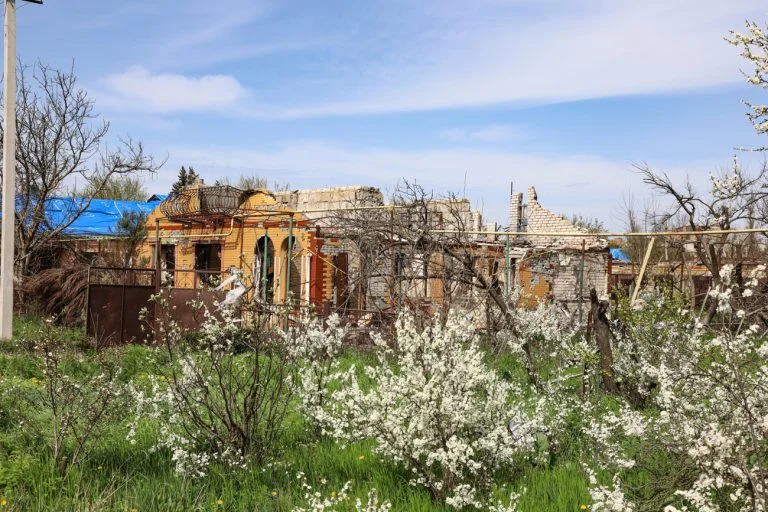The government decided on the comprehensive reconstruction of several towns of Ukraine, which were completely destroyed by the Russians in the spring and summer of 2022. Among them is the village of Posad-Pokrovske, which for many months actually became the front line and was seriously damaged. The comprehensive reconstruction project is experimental, Prime Minister of Ukraine Denys Shmyhal said.
We decided to see with our own eyes what exactly will be rebuilt and how local residents perceive it.
“The elder, Serhiy? He is in the cemetery, the boy`s funeral is being held today,” the woman with the bicycle tells us.

In a moment, the woman standing next to her gives us her two bouquets of flowers and asks to put them on the grave, having learned that we are going to the cemetery. A lady on a bicycle decides to escort us.
On the way, Oksana says that she loves her native village very much and is waiting for its reconstruction, but opposes moving to a cottage town, which the government allegedly wants to build for those who have lost their homes.
“We are those used to living on our own land . The land feeds us. Even if destined to live in a bombed house, then at least on our own land,” she explains.
As we found out along the way, no one officially announced any plans to build the cottage town, but the villagers are sure it to happen.
During our conversation we are walking past broken houses and bombed club.
On the way, Oksana tells us that many of the neighbors have not returned to the village, and she herself lives in Mykolaiv and comes to the village only for the sake of her household.
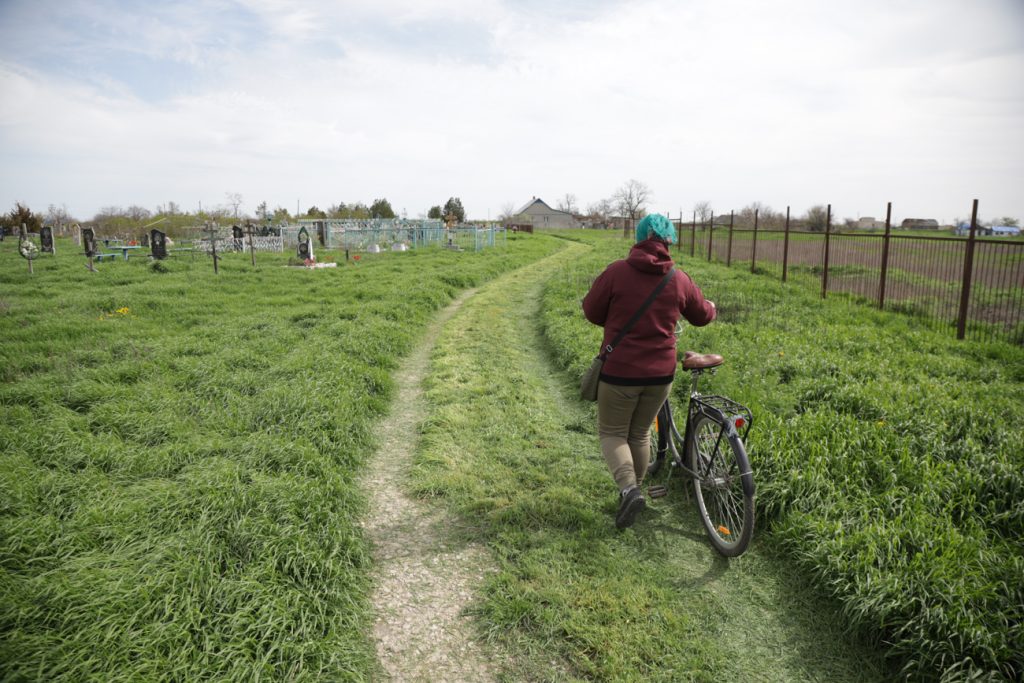
“We lived well. We had everything until they came,” she says sadly, and points to a building near the cemetery.
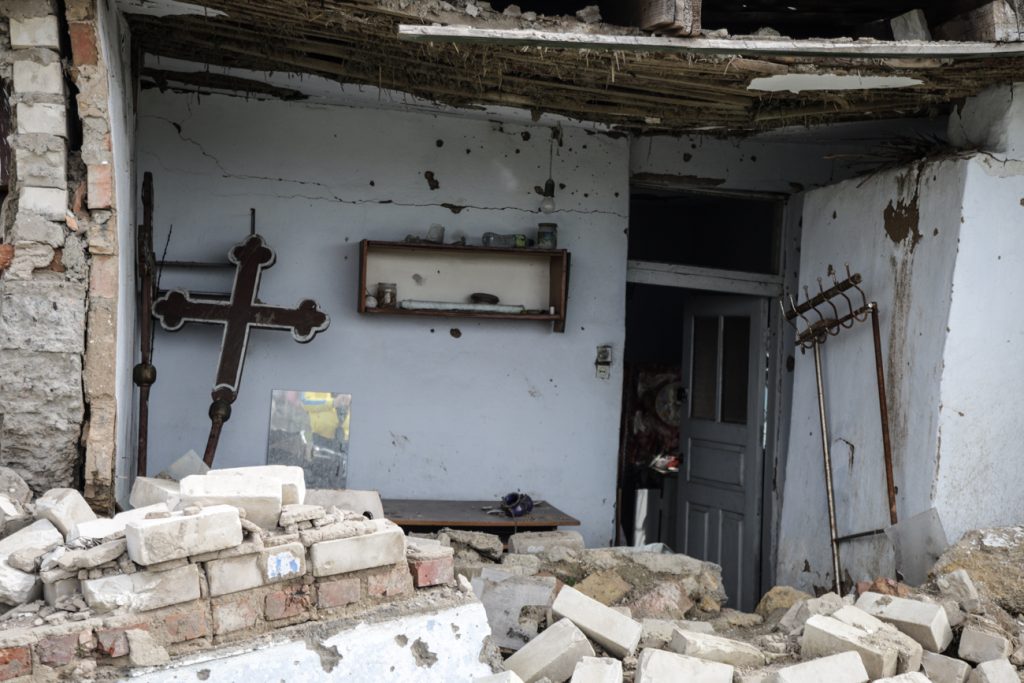
Before the arrival of the Russians, local children were baptized in this room. Now this building looks more like a large children’s doll house.
The memorial service at the cemetery is coming to an end. The guard of honor fires three volleys, saying goodbye to a combat sworn brother. Ihor would have turned 31 in May.

It is not his parents who are burying him, but his godmother, because the boy was born in one of the cities on the left bank of the Kherson region. That is where his relatives are now.
Some girl films her farewell on her mobile phone. Apparently, this recording in the occupied city on the left bank of Kherson region will be secretly watched by crying parents from the Russians.
The godmother of the fallen soldier buried her eleven-year-old son last year. The boy died during the Russian artillery attack on the village.
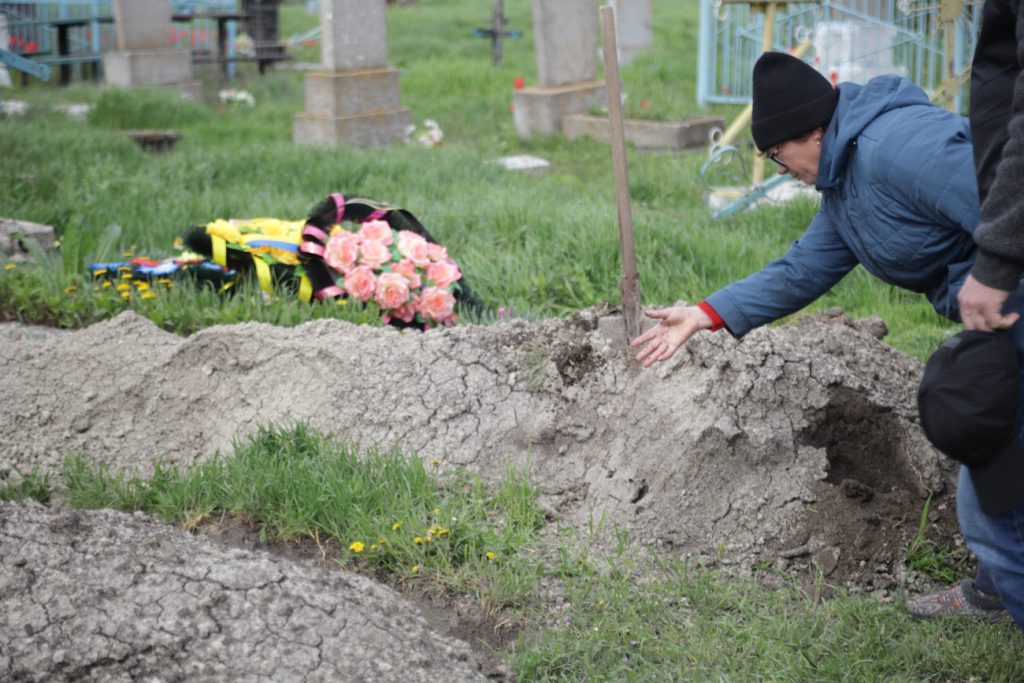
In total, almost 40 people died in the village last year, among them almost a third were children.
From the cemetery, we return to the center, where we agreed to talk with the elder Serhiy Kulakovsky and the head of the Chornobayiv community Ihor Dudar.
Two central streets and the square in front of the broken building of culture are littered with construction materials.
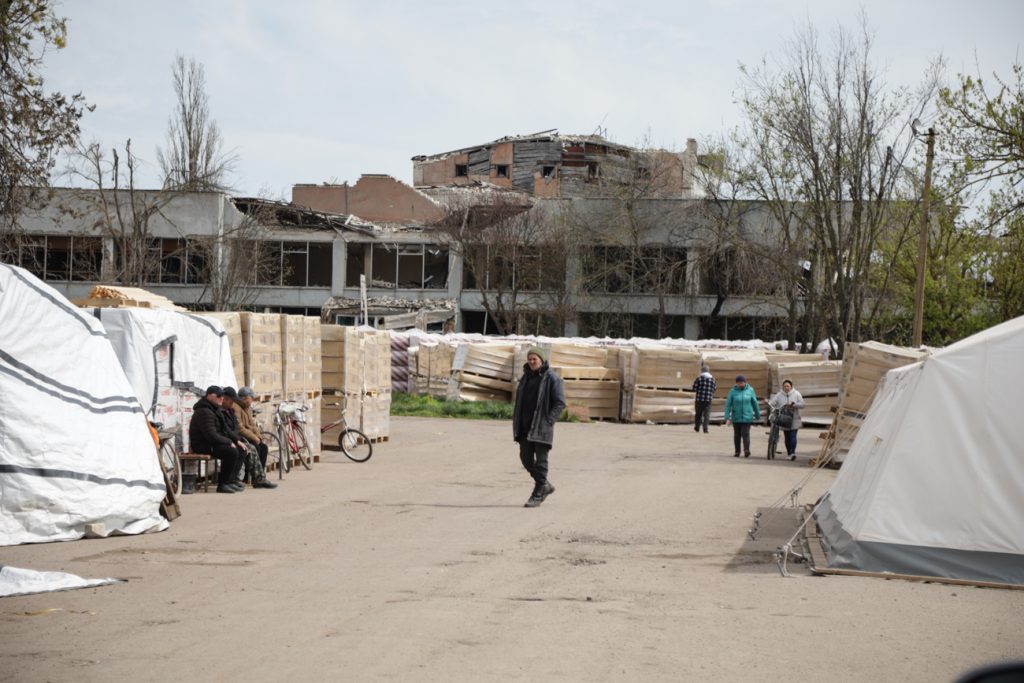
“These are not building materials. These are modular houses, we set them up here, and then deliver them around the village. Some neighboring villages are keeping their modular houses here and gradually are taking them to their villages,” says Serhiy.
Along with building materials, entrepreneurs sell products. Business is not that good, but there are buyers. In contrast to Kherson, where market sellers complain about weak purchasing power, Yana and Serhiy say that they sell goods that are not included into humanitarian kits.
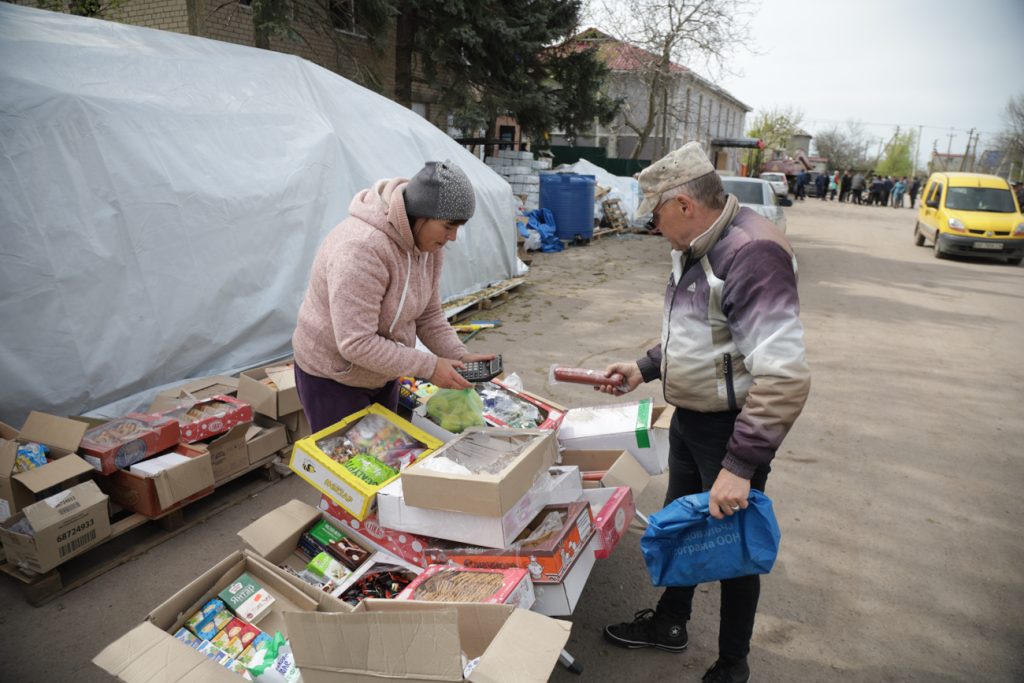
Before the full-scale invasion, they had a store on the highway, now it is completely destroyed.
“Now we have to start all over again,” says Serhiy.
According to him, the war pushed them back to the 90s, but it was still calmer then.
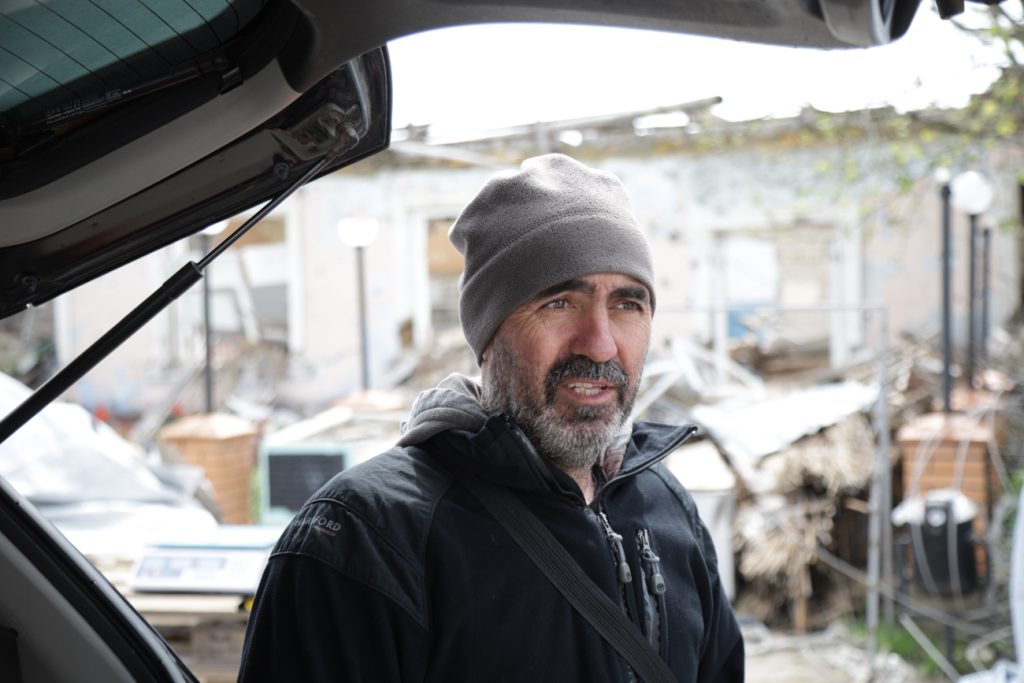
At this time, Ihor Dudar is talking with local residents on the street, right next to the destroyed starostat building.
People are interested in the issues of reconstruction and compensation for property destroyed by the Russians.
“You see, the survey commission is working. Now there is already accurate information that, first of all, only houses will be compensated. Compensations for sheds and kitchens are not on the agenda now. That’s for sure,” he tells people.
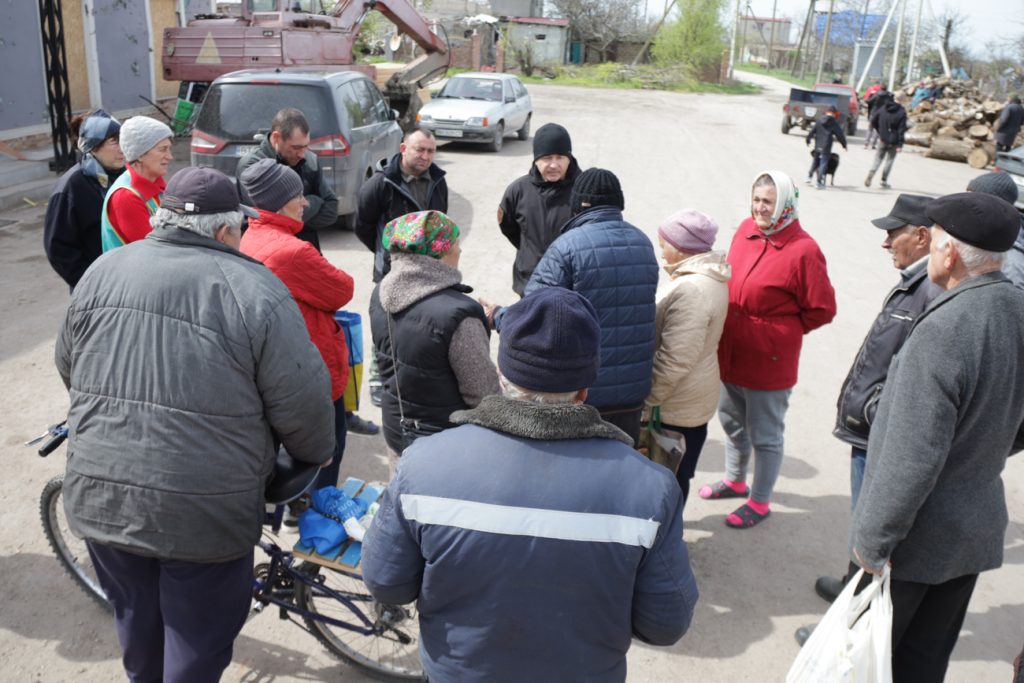
Discontent is heard in the small crowd.
“And where will my little cow live?” – asks the grandmother quietly.
The elder does not seem to have an answer to these questions, but he continues to convince his voters that they will gradually rebuild everything.
“We have to win, and then take everything from the Russians through reparations. With this money, we have to rebuild everything, from the house to the fence,” says Dudar.

All this time, literally a few tens of meters from the impromptu meeting, people are weighing firewood and loading it into trailers. Everyone can take 200 kilograms at a time. There is no queue for firewood, although there is still a need for it, despite the fact that the spring sun is already scorching.
There is no electricity or gas in the village since March 14, 2022. They cook and heat here with the help of a stove.
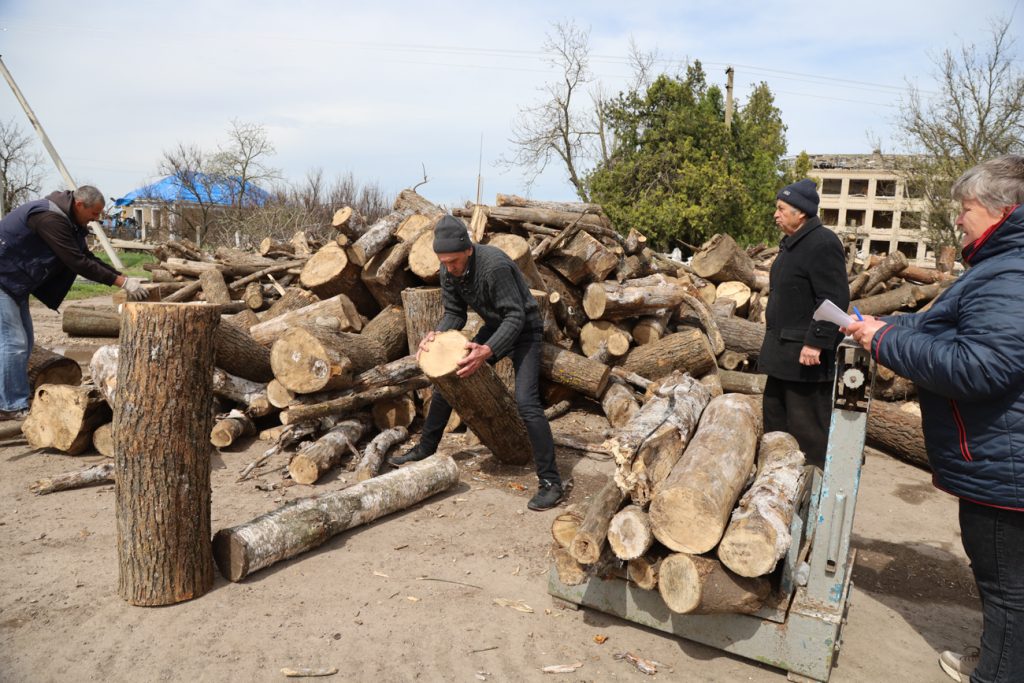
While we are talking about the quality and quantity of firewood with the people loading it, we notice that the crowd is gradually moving from Ihor Dudar towards the starostat building, where a queue has already lined up.
At exactly 11:30, a minibus from which large boxes are unloaded arrived. One of the charity organizations brought hot lunches.
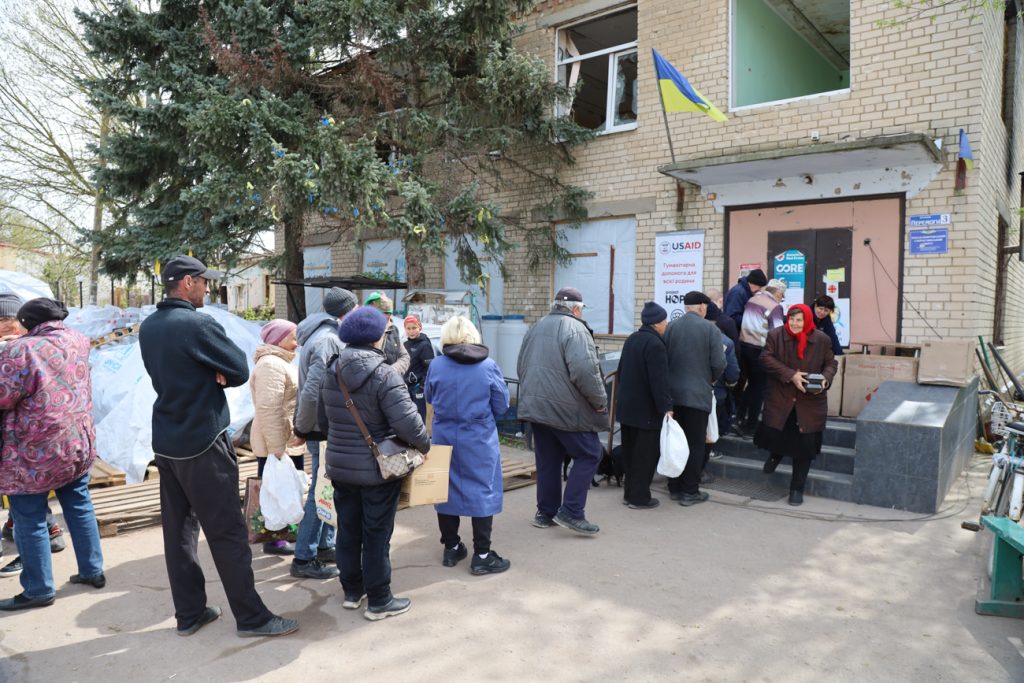
“They bring 400 lunches every day. It helps a lot, people have a hot meal once a day,” says Serhii, the head of the community.
Without haste and conflicts, people disassemble boxes with food. The woman, who was worried about the cow and her home, takes 8 boxes at once – for herself, relatives and neighbors. The square is gradually emptying, merchants are also gathering – the business activity of the residents of Posad-Pokrovske decreases in the afternoon.
But it is crowded in the local Point of Invincibility, which is also located on the central street. It is a former pharmacy owned by a local farmer. The building, like all others in the village, was destroyed, but it was quickly restored. There is electricity, internet, and the premises are heated with a stove.
This is the only place in the village where you can charge your phone, talk to your neighbors, and share the latest news.
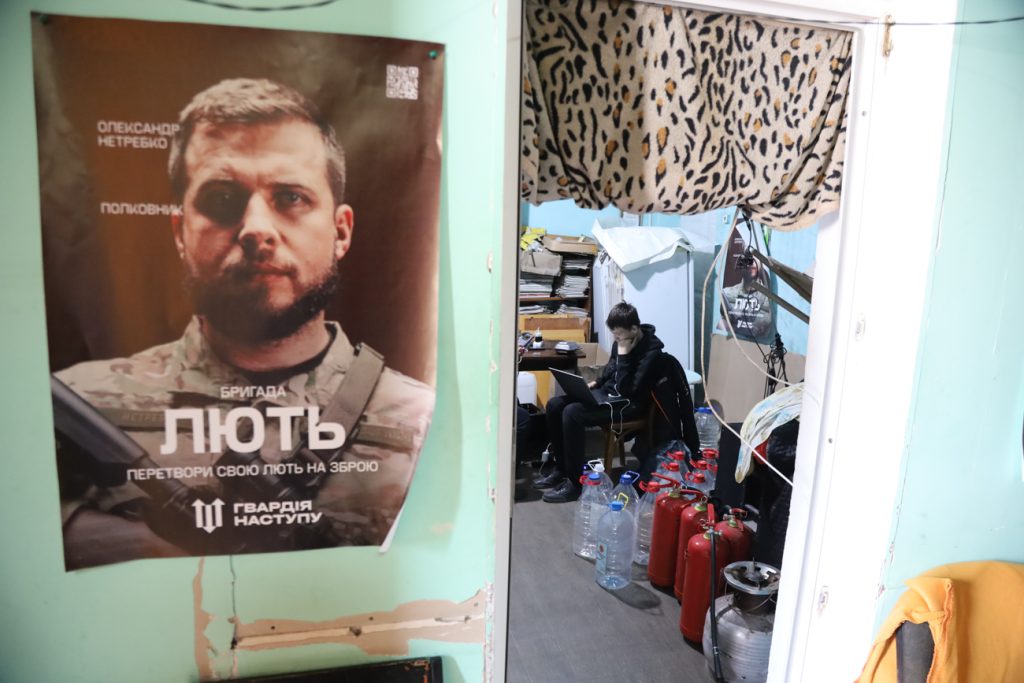
Maksym, an eighth-grade pupil at a local school, comes here every day as if to work. He does not like online learning very much, but he tries to complete all the tasks. He had a few friends left in the village — everyone else had evacuated.
There are not so many children left in Posad-Pokrovske, so a small room was allocated for their education in the Point of Invincibility and, according to them, that is enough for now.
The school in the village was large, built of silicate bricks. In the spring and summer of 2022, it was almost completely destroyed. There are many huge funnels on the ground and holes in the walls now. The left wing of the school is completely destroyed.
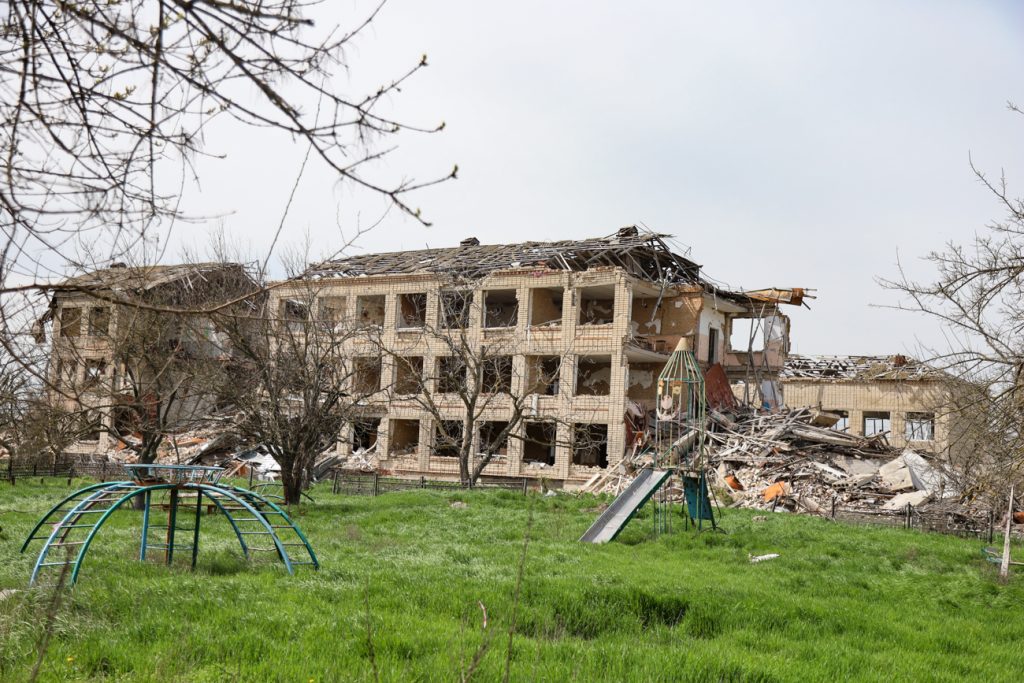
In the sports hall, only the rope and a room with sports equipment and awards remains undamaged.
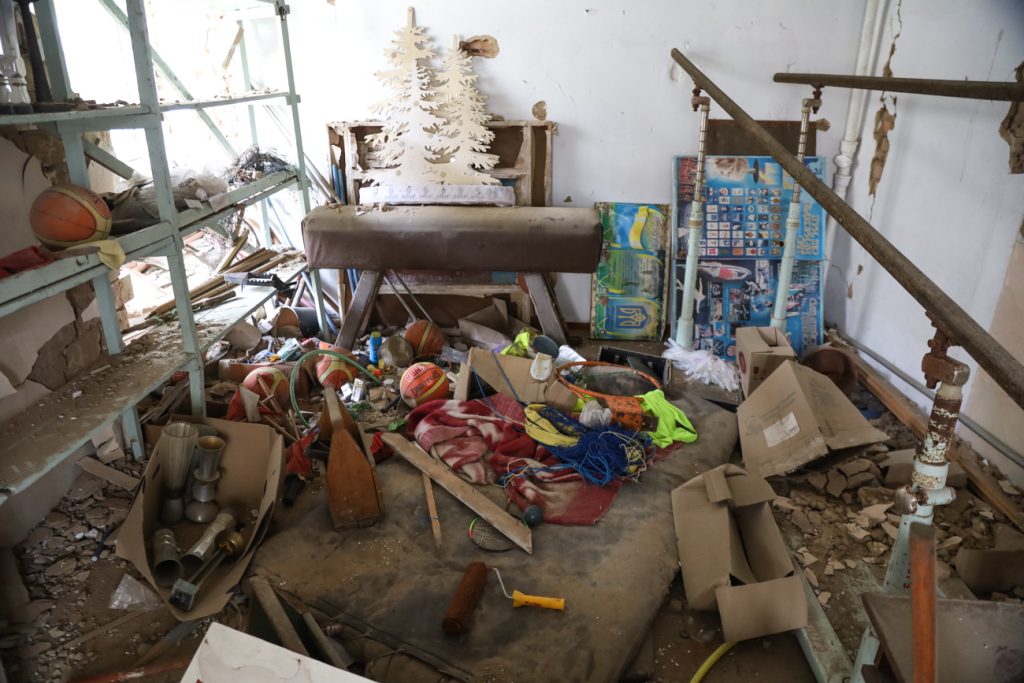
The neighboring kindergarten was also destroyed. Especially the part facing north.
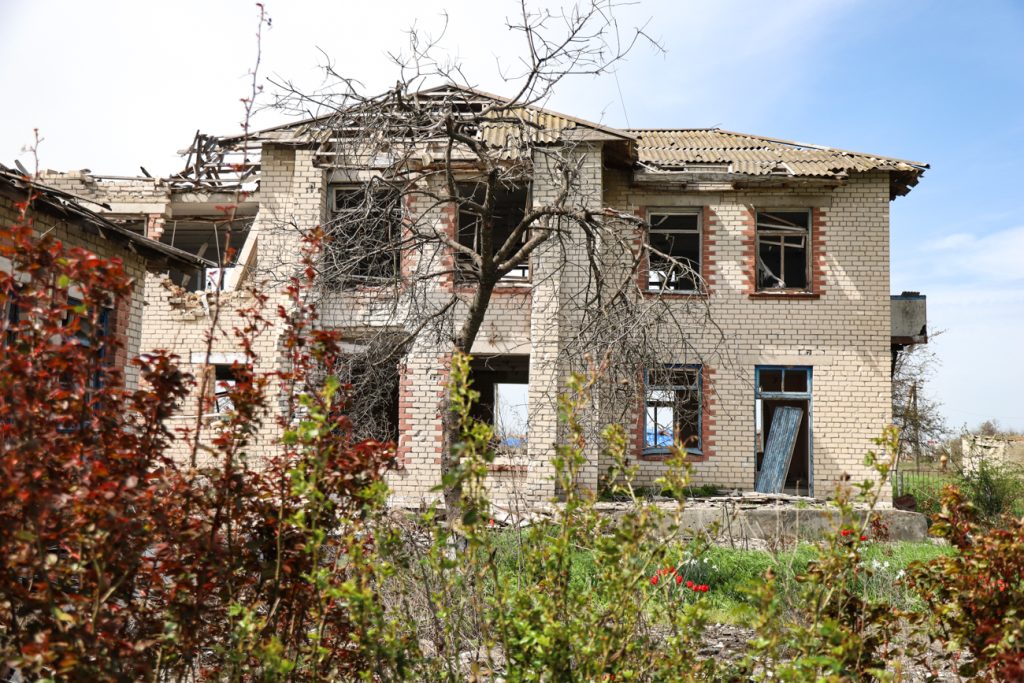
“Of the 940 buildings, three dozen houses, say members of the commission that examines and records the damage, remained intact. But there are still marks of war. 350 houses were completely destroyed, 300 were moderately damaged. All objects of the social sphere are destroyed. A school, a kindergarten, all shops, the building of the Starostat,” says the head of the community.
Posad-Pokrovske became part of Chornobayivka community in 2020 not by its own will. The authorities of Chornobayivka did not create the UTC (United territorial communities) until recently, and the Cabinet of Ministers did it for them.
“Look, everything is destroyed here. We had problem with management even before the war. If I had such a mess at my workplace, I would lose respect for myself,” says Dudar, pointing to the dilapidated building of the local communal farm.

There used to be a summer cinema here, but now there are several old, even in appearance, machines and piles of broken bricks lying around.
Together with the old woman, they examine how they had part of the premises cleaned and discuss what to do next. We are waiting for what they will say about bad predecessors, but both are silent.
They understand that Posad-Pokrovske should become a kind of showcase of the Kherson region. Starting from November 11, hundreds of thousands of people passed through the village, who, even at high speed, saw that the enemy had destroyed literally everything here. It is important for central and local authorities to show donors a successful history of reconstruction.
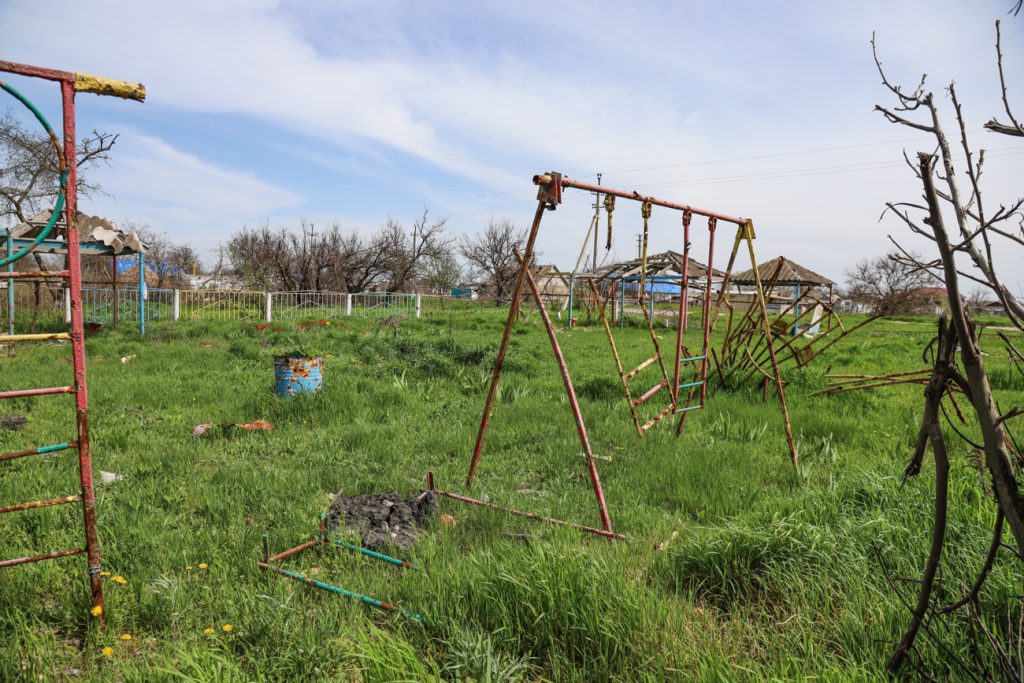
“We have communications, lights being repaired and the specialists started to restore the main line that will supply electricity, but everyone has heard the story when some electricians got blown up. Now there are no people who could do such kind of work . There is a big problem with gas, because the network was laid by air, there is not a single surviving pipe”, – describes the state of affairs Ihor Dudar.
He also tells the insider that domestic scientists are developing a project for comprehensive reconstruction of the village. Together with the replacement of 100% of communications, which were already worn out almost completely even before the war.
Now, people who, despite the problems and risks, return home, are trying to settle in modular houses.
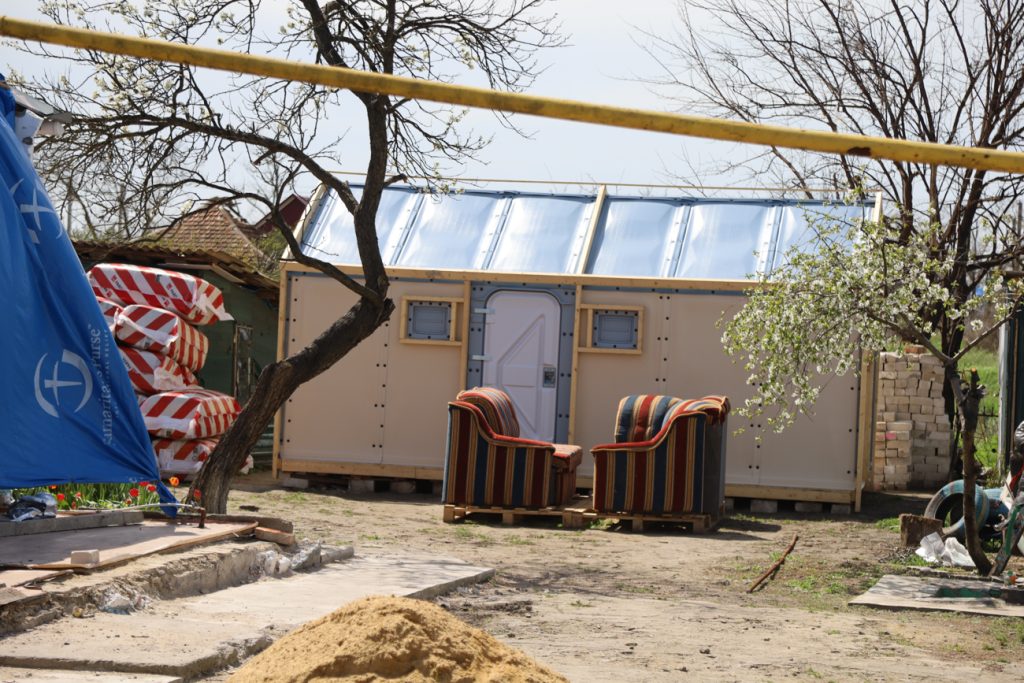
And what we initially took for building materials were parts of these houses, which are installed for temporary living. They were provided by the Swedes.
In total, the authorities received applications for the installation of 328 houses. About 30 have already been installed.
One of the problems became apparent when they began to think about how to install these houses. The villagers are in no hurry to join up.
“We barely selected 5 people who were sent to Rivne for training. But this is not enough. These 5 men will most likely be the foreman of the brigades that will be created. There is already an algorithm for building houses. But we actually set them up for 2-2.5 days, so how long will it take to set up 328? Now we are bringing people from other villages of the community, they are taking on obligations and will help the residents in this way,” says the head of the community.
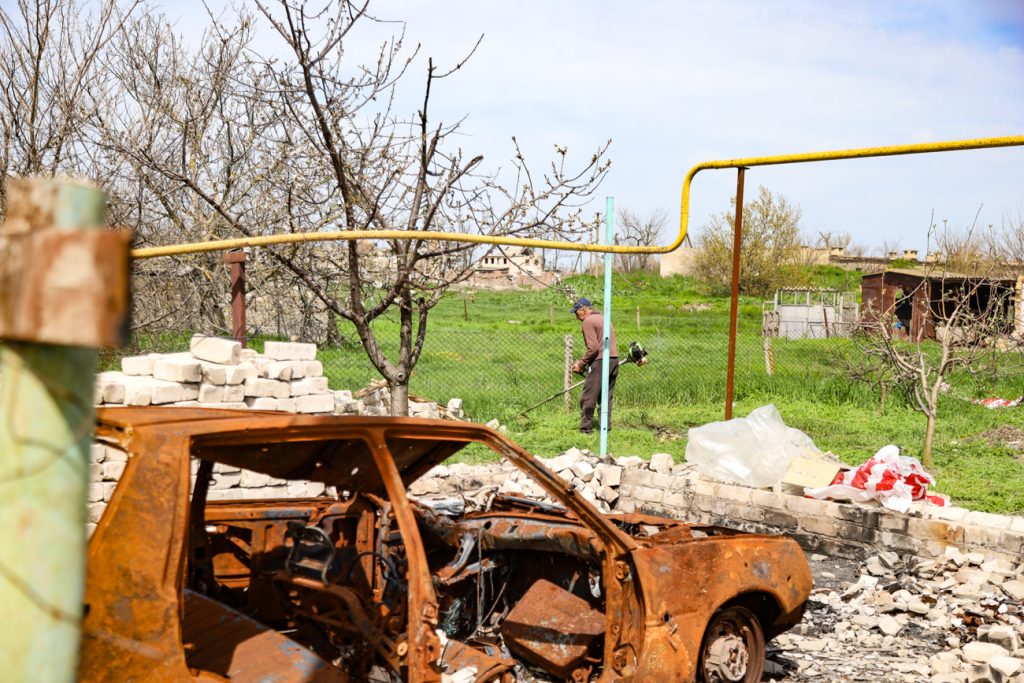
It`s apparent that this situation is unpleasant for him, and he tells us at length about subsidiarity.
“I would like the war to change us, to unite us. That’s how we guide people, but sometimes I`m too old to make certain kind of work and young people often avoid work . But once we bring a humanitarian aid – young people immediately take it. Hundreds of people left, but there is no one to work,” says the chairman, calling it a consumerist approach.
At the time of our stay in Posad-Pokrovske, no one lived in the already set up module houses – the nights are still cold, and the heating there is electric.
In many yards, these houses lie in the form of sets.

“I also want to take one for myself. You see, my house is battered, I patched it up a little, but it is impossible to live there. We need to get a house like this module one,” says a man who went out to find out who this stranger is walking around the village.
He is ready to set it up himself, but adds that once someone is trained, then let these people set it up.
As we walk down one of the streets, we see a utility tractor transporting these temporary houses. The air smells of cherry and blackthorn blossoms.
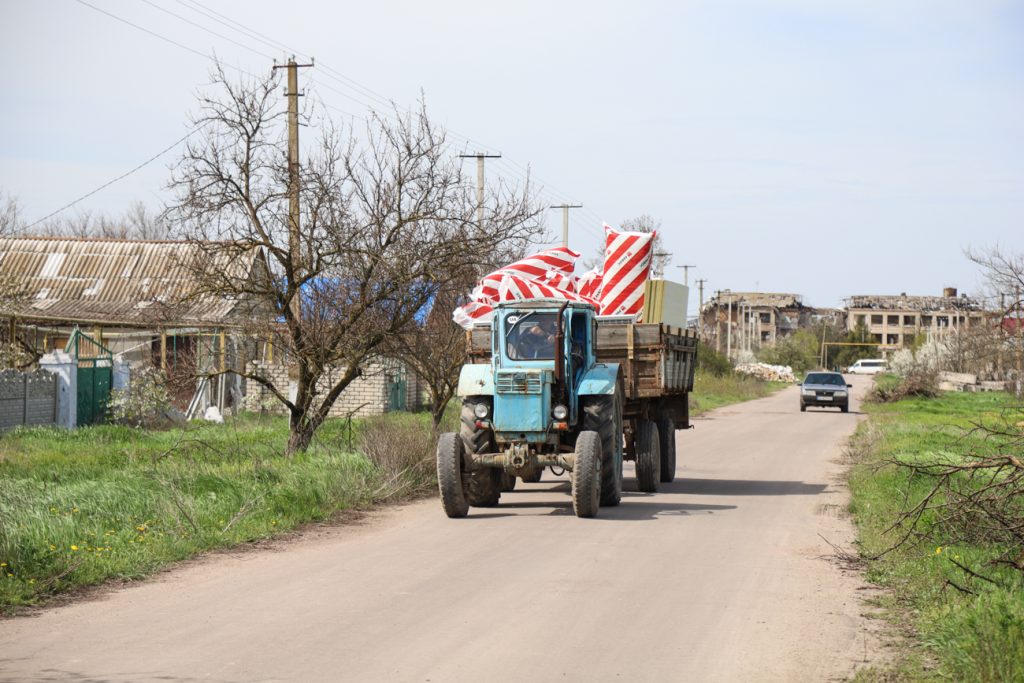
Houses in the center of the village and on the northern outskirts are the most damaged. The closer to these very neighborhoods, the more burned houses. The wind sways burnt garlands, to which icicles from the melted Plexiglas of the porches have been added.

On the outskirts, we see our military positions dug into the walls of an old, abandoned water channel. Trenches stretch from the channel to the houses. And in front of all this is an unplowed field.

“All private plots of land and homesteads are now being demined. We heard three explosions in households recently. “They went through the garden with a trawl, where everything was supposedly clean, and three explosions occurred at once,” says Dudar.
There were no mines in the village and its surroundings, but a lot of unexploded ammunition, including cluster ones, was found. No one knows how long it will take to completely clear the village, but while we are walking through the streets , we see cars with bomb techs. There`s a constant work going on
People live a dream here. This is what Larisa Sokolova, who officially works in the Starostat as a clerk, but unofficially deals with everything, like the elder Serhii, tells us.
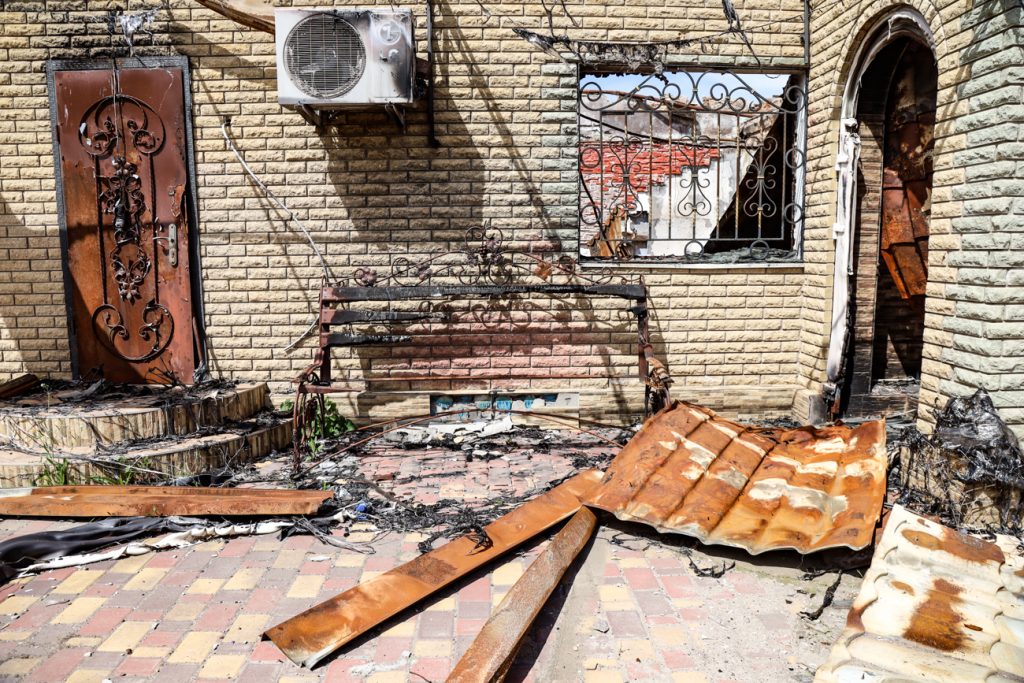
“European village. This is my dream. My dream is to rebuild a European village with all communications,” she says.
People will begin to return not after the start of reconstruction, but after electricity restoring. It should happen in May.
All three officials with whom we spoke say that they will start the reconstruction, most likely, from the school, the leisure center, and the kindergarten. Restoration will take place at state expense. It is not yet clear about the houses. They already have 300 applications, surveys and requests for housing restoration.
“There is 17 billion in the state budget, and it was announced that financial support would be provided from these funds, but this is not the construction of new houses, this is the restoration of damaged ones. This is a repair,” says Ihor Dudar.
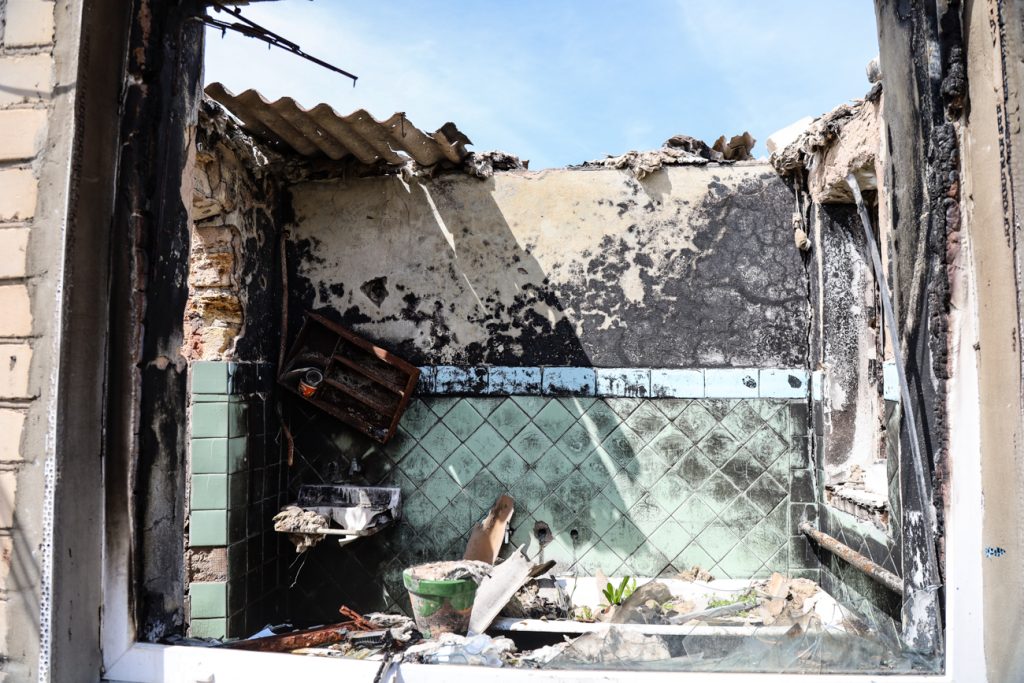
There is no talk of building a new home yet.
But Larisa, who is dreaming of rebuilding a European village, also has hope.
“Hope is the last to die, the president made a promise when we had him in our village,” she concludes a short conversation, refuses to be photographed and goes to work.
The air in Posad-Pokrovske subtly smells of blooming blackthorn and cherry.
Serhii Nikitenko


